
Dengue fever is a mosquito-borne viral infection that affects millions of people globally every year. It's a significant public health concern in tropical and subtropical regions. One intriguing question that researchers have explored is whether the severity of dengue changes with high temperatures. In this article, we'll delve into the relationship between dengue severity and elevated temperatures, examining the scientific evidence and implications for public health strategies.
Dengue fever is caused by the dengue virus, primarily transmitted to humans through the bite of infected Aedes mosquitoes. The virus exists in four distinct serotypes and can lead to a range of symptoms, from mild fever to severe dengue, also known as dengue hemorrhagic fever or dengue shock syndrome.
Various factors contribute to the severity of dengue infections. These include the individual's immune response, the specific serotype of the virus, and the presence of pre-existing antibodies. However, researchers have begun to investigate whether environmental factors, particularly high temperatures, also play a role.
Studies have shown a potential correlation between high temperatures and increased dengue transmission and severity. Warmer temperatures can accelerate mosquito breeding and shorten the virus's incubation period within the mosquito, leading to a higher transmission rate. Moreover, elevated temperatures might enhance the mosquito's ability to transmit the virus to humans.
With global climate change, rising temperatures are becoming more common. This has raised concerns about the potential expansion of dengue-prone areas and the increased severity of outbreaks. Warmer temperatures could lead to the proliferation of Aedes mosquitoes in regions that were previously less conducive to their survival.
Recent research studies have provided valuable insights into the relationship between temperature and dengue severity. A study published in [Journal Name] found that regions with higher average temperatures experienced more frequent and intense dengue outbreaks. The research suggested that these changes in severity were linked to both mosquito behavior and the virus's replication rate at higher temperatures.
The potential impact of temperature on dengue severity underscores the need for adaptable public health strategies. Governments and health organizations in dengue-prone regions must consider climate data alongside traditional epidemiological factors when designing prevention and control measures.
Given the influence of temperature on mosquito behavior and breeding patterns, intensified mosquito control efforts are crucial. This includes eliminating breeding sites, using insecticides, and implementing community-based initiatives to reduce mosquito populations.
In conclusion, the severity of dengue fever may indeed change with high temperatures. The relationship between temperature and dengue transmission and severity is complex, involving various mechanisms that influence both mosquito vectors and the virus itself. As the global climate continues to change, understanding these dynamics becomes increasingly vital for effective dengue control and prevention.
Is it Okay to Wear Earplugs to Bed?
5 Intriguing Ways That Soy Milk Is a Powerhouse, According to Skin Bounty
How Our Body Clock Forms a Circadian Rhythm by Detecting Light ?